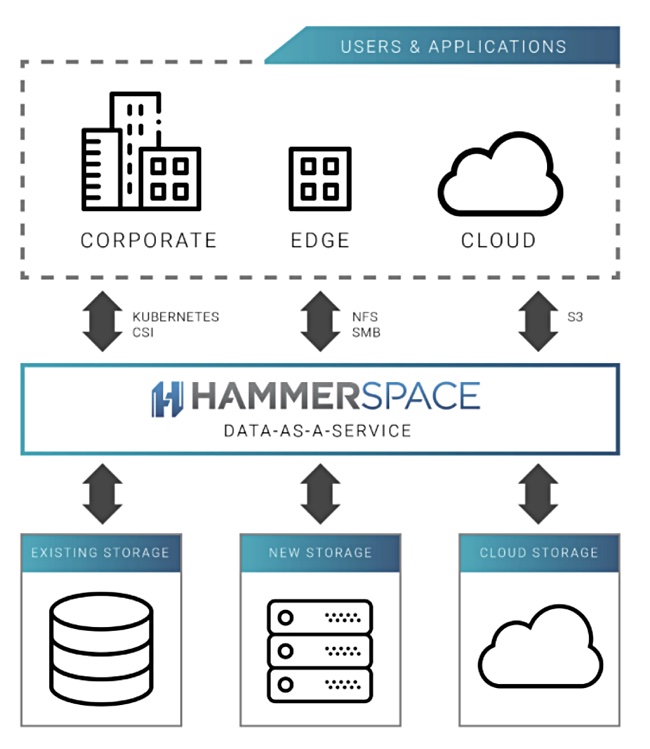Hammerspace came out of stealth in December 2018 with a software technology said to unify file silos into a single network-attached storage (NAS) resource that can provide access to unstructured data anywhere, in hybrid or public clouds. Since then it has extended its reach, for example, adding Kubernetes support and ransomware protection.
Blocks & Files had the opportunity to conduct an email interview with CEO and co-founder David Flynn. We asked him how the Covid-29 pandemic has affected the company and also how Hammerspace positions itself against competitors. His replies have been edited for brevity.
Flynn co-founded FusionIO, a pioneering all-flash storage startup, but left the company about 18 months before its $1.1bn acquisition by SanDisk in 2014. He then co-founded Primary Data, a data management startup that bagged $100m funding in cash and debt over four years. However, the company shut in January 2018 without bringing product to market. Hammerspace emerged from the ashes in May 2018, in the same offices as Primary Data.

Blocks & Files: How has the Covid-19 pandemic affected demand for the Hammerspace product?
David Flynn: The pandemic is forcing people to accelerate their cloud initiatives, deploying tools, and workloads at scale to support unexpected growth in their remote workforce. Hammerspace helps customers leverage the infrastructure that they already have to get their data to the cloud nearly instantly and without the need for a data migration. Hammerspace is experiencing a surge in demand, as customers see us as an easy-button for their woes.
Hammerspace saves time and cost for IT by greatly reducing intervention, eliminating tedious tasks like sync jobs between sites or remote backup. Customers tell us that this saves them millions of dollars.
Blocks & Files: How does Hammerspace tech help work-from-home employees?
David Flynn: We have been working with our channel partners and Citrix to increase productivity and the experience for Citrix Virtual App and Desktop users (CVAD). What we bring to Citrix VAD is that users and all their data no longer must be ‘homed’ to a single location.
Hammerspace untethers ‘User Profile Data; so that we can automatically and instantly bring it closer to the users, increasing productivity by saving time and improving performance.
Also, because our replication is multi-site active-active, user data won’t be lost in an outage. So, regardless of where your employees or consultants sit – we can get them to access their data using the cloud, co-lo facilities, or their own data centers without a hiccup.

Blocks & Files: How has Hammerspace messaging changed concerning the relationship between data and the storage infrastructure?
David Flynn: Over the last year, our messaging has evolved; but the fundamentals that the company was founded on remain true.
Hybrid IT is made up of multiple data centers full of mixed infrastructure from various vendors pushing an array of cost-models. The only way to bring order to this chaos is to adopt a data-centric approach to how we store, access, manage, and protect data.
Hammerspace helps customers by intelligently leveraging the underlying infrastructure without being subordinate to it. Our model turns that chaos into a strength, giving us the resources to adapt to ever-changing needs by continuously optimizing data across any-and-all hybrid infrastructure.
Blocks & Files: How do you market this?
David Flynn: How do we market a successful product around it? People have budgets for storage that do data management, but they don’t have budgets for data management. So, we have taken the gloves off and position ourselves as software-defined hybrid cloud storage.
Hybrid cloud storage from Hammerspace can store, serve, manage, and protect data anywhere – on white-box servers, on enterprise NAS, on any public or private cloud, and in Kubernetes. We emphasize our unique value including data-in-place assimilation, an active-active global file system, autonomic data mobility, Kubernetes integration, and enhanced metadata. We do this while significantly reducing the overall TCO of storage, improving performance, and getting complexity under control.
Blocks & Files: What sort of customers buy Hammerspace and why? What amount of data do they need to have stored for them to find Hammerspace technology useful?
David Flynn: Hammerspace customers are diverse, spread across telecoms, media & entertainment, financial services, federal, and pharmaceuticals – among others. While some of our customers have industry-specific workflows, the broad base suffers from many of the basic hybrid cloud use-cases such as data migrations, DR to cloud, archive, or adding persistent storage to Kubernetes.
Our customers have told us that they are looking for something easier to manage while reducing the overall cost of storage. Data growth is forcing them to search for a better way to get hundreds of TB to tens of PB of unstructured data to the cloud and are frustrated with the storage-centric approaches pushed by legacy NAS vendors and their derivatives.
Blocks & Files: Is Hammerspace a software-defined storage metadata management product that abstracts existing file and object storage in whatever on-premises or public cloud location it happens to be, and enables customers to better optimise data placement for performance, cost, and compliance?
David Flynn: This is a great way to articulate what we do, but I would make a few suggestions. Right now, Hammerspace is not targeting regulatory compliance use-cases. On the other hand, our product is fully featured for data protection and to serve data directly as storage.
One other essential note – we are also having success as a storage and data management solution for Kubernetes. We upend the misguided idea that you need to create yet another storage silo with a container-specific storage platform. With our CSI driver, we support both block and file persistent volumes, we provide feature-rich enterprise-class data management capabilities to Kubernetes for single, multi-cluster, and hybrid-cloud environments – using any storage.








